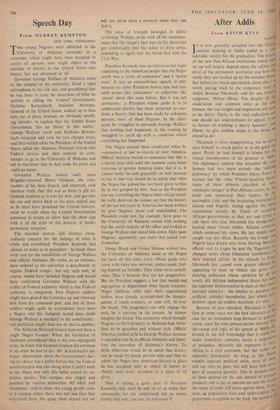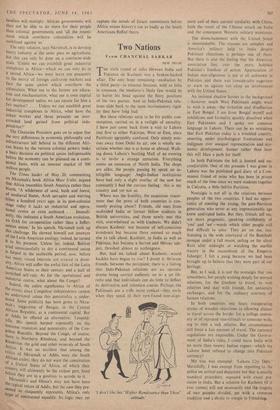After Addis
From KEITH KYLE
NAIR00 T is now generally accepted that the African summit meeting at Addis ended as a Oa' siderable victory for the gradualists. The success of the new Pan-African institutions which set up will largely depend upon the calibre and drive of the permanent secretariat and how !sin" cerely they are backed up by the member Sta'cs' But before too much speculation about this. it Is worth paying heed to the temporary loser .at Addis, Kwame Nkrumah, and his one faithful supporter, Milton Obote. For despite all the moderation and common sense at the CO' ference, the real insight and inspiration still sea' to be theirs. Theirs is the real radicalism a° one should not underestimate its appeal. `i in favour of wielding a heavy hammer.' Obote, 'to give definite shape to the things " intend to do.'
Nkrumah is often disappointing, but he O'er does himself so much justice as in the great sct- piece. Partly he had himself to blame for Ow virtual friendlessness of his position at Addis. The diplomatic pattern that preceded the CO ference had two main strands—the 'militant diplomacy' by which President Sekou Toure of Guinea led the other French-speaking Stale'' many of them hitherto classified as colonialist stooges in Pan-African circles, by thc hand and sponsored their leaders in Ih1, nationalist club; and the increasing alienation °I Ghana and Nigeria. Going against the ircfld represented latterly by Toure of acceptf10 African governments as they are and trying t° talk them into line, Nkrumah has energeticall)' backed those forces within African countries which endorsed his views. He has simplY bL caught out too often. Recently the Congo Nigeria have drawn very close. During Adonhy' official visit to Lagos he and the Nigerians eY changed notes about Ghanaian interference 1° their internal affairs: In his attitude to T°V; Nkrumah has caused even greater offence hi appearing to want to violate the great sel denying ordinance whose adoption by all (`) nearly all) African independent States has bCC the supreme demonstration to date of their national maturity: the resolve to preserve. ,artificial colonial boundaries, lest ethnic frle Clentism open up endless occasions for war. , Because of past mistakes, Nkrumah is thcre.5 fore in sonic ways not the best advocate of, 11,11 case for an immediate leap forward to poSalci`tt union, since his own person invites distrust. )c. the sweep and logic of his speech at Addi5. clet livered in the full knowledge that it could ri.°11 make immediate converts, invite a suspens, of prejudice. Basically his argument is th's; Africa is a rich continent, but her riches ar unevenly distributed. So long as her States Ill remain separate political units, most of the will not only be poor, but will have little PrQst pect of escaping poverty. This is because:11°s of them depend on the sale abroad of pomade products and as far as one can see into the foto!, the terms of trade will move against them. over, as population rises and tpchnological provement is applied to the land, the number o' , landless will multiply. African governments will then not be able to do more for their people than colonial governments and 'all the resent- ment which overthrew colonialism will be mobilised against us.'
The only solution, says Nkrumah, is to develop heavy industry at the same pace as agriculture, but this can only be done on a continent-wide scale. 'Unless we can establish great industrial complexes in Africa—which we can only do in a united Africa—we must leave our peasantry to the mercy of foreign cash-crop markets and face the same unrest which overthrew the colonialists. What use to the farmer are educa- tion and mechanisation, what use is even capital for development unless we can ensure for him a fair market? . . . Unless we can establish great industrial complexes in Africa, what have the urban worker and those peasants on over- crowded land gained from political inde- pendence?'
The Ghanaian President goes on to argue that the very differences in economic philosophy and infrastructure left behind in the different Afri- can States by the various colonial powers make a basic decision on political union indispensable before the economy can be planned on a conti- nental basis, with an internal market of 300 million people. The Times leader of May 20, commenting on Nkrumah's book Africa Must Unite, argued that Africa resembles South America rather than North. 'A wilderness of sand, bush and forest, of mediwval States, Arab satrapies and warring tribes a hundred years ago; in its post-colonial stage today it lacks an industrial and opera- tional centre or even seaboard. . . . Immedi- ately, this indicates a South American evolution, an OAS for co-operation rather than a Jeffer- sonian union.' In his speech, Nkrumah took up this challenge. He showed himself not unaware .of the Latin American analogy; indeed, he turned it. to his purpose. Unless (as, indeed, Bolivar tried unsuccessfully to do) a continental union Is forged in the malleable period, now, before too many vested interests are created in diver- sity, Africa will suffer the awful fate of the Latin American States in their century and a half of tarnished self-rule. M for the operational and industrial centre, what about the Congo? Indeed, the entire significance to Africa of the events since Congolese independence cannot be understood anless this potentiality is under- stood. Some publicity has been given to Nkru- tnah's suggestion of Bangui, in the Central African Republic, as a continental capital. But at Addis he offered an alternative: Leopold- !die. His speech harped repeatedly on the intmense resources and potentiality of the Con- golese Republic. Beyond the Congo, of course, there IS Northern Rhodesia, and beyond the Rhodesias, the gold and other minerals of South Af.rica. It was no accident that among the critics of Nkrumah at Addis were the South African exiles; they do not want the constitution 13f a United States of Africa, of which their country will ultimately be the richest part, fixed before they are in a position to accede to it. thNkrumah's and Obote's may not have been e typical voices of Addis, but the case they pre- sented so eloquently represents Africa's only hone of continental equality. Its logic may yet capture the minds of future summiteers before Africa misses history's cue as badly as the South Americans fluffed theirs.



































 Previous page
Previous page